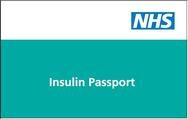Insulin Passport

The adult patient's passport to safer use of insulin
The Insulin passport was first developed by NHS Diabetes and supported by Diabetes UK to improve patient safety by empowering patients as they take an active role in their treatment with insulin.
What is the insulin passport?
As a person with diabetes using insulin, you can choose to carry a credit card size paper record called the Insulin Passport.
It can be used to record:
. Up to date details of the type of insulin, syringes and pens that you use
. Emergency information that tells people what to do if you are found ill or unconscious; and
. Other information to help in an emergency, including contact names and telephone numbers and other medication that you may be taking
How to use your Insulin Passport for greater safety.
Know the details of the type of insulin you use, and the pen, syringes and other equipment that you use.
. Record this information yourself in your Insulin Passport.
. Keep it up to date. Whenever your insulin type changes draw a single line through the old information, so that new information can be clearly seen
. There is an option to record other medication that you take.
. When you need a new passport ask at the Diabetes Centre York Hospital or see your GP or practice nurse for a new one.
. Include information on what you want people to do if you need help with a low blood glucose level (or hypoglycaemic event)
. Keep your credit card sized Insulin Passport somewhere easy to find in an emergency, like your wallet or purse.
Getting the right insulin.
Getting the right type of insulin is very important as they all act in a slightly different way, and getting the wrong type by mistake could lead to high or low blood glucose. Too low and you might end up collapsing from a hypo - to find out more about hypos click here: http://www.nhs.uk/Conditions/Hypoglycaemia/Pages/Symptoms.aspx
Staff who prescribe or supply your insulin will do their best to make sure you always get the right type of insulin and the right equipment to use it with. Most of the time they get this right, but getting it right all of the time is difficult. This is because there are many different types of insulin, and many different ways to give it including vials, cartridges, pre filled pens and insulin syringes. If you understand the types of mistakes that have happened in the past, you can help people to make sure you always get the right insulin.
Potential problems.
You could get the wrong type of insulin to use with your pen. Some types of insulin with similar names could get mixed up. Consider the cases below:
- A patient was sent home from hospital with the wrong insulin pen, so was unable to give their insulin.
- A patient was given a Luxura pen rather than a Novopen 5.
- A patient was given Novorapid insulin by mistake instead of Novomix 30. This gave them a "hypo" and they became confused and fell. Luckily the patient was found by his son and taken to hospital.
What you can do to make sure you get the right insulin.
. Show the information in the Insulin Passport to healthcare professionals to help the check you have the right insulin.
. Check that you have been prescribed the right type of insulin and that all the equipment you need, such as vials, cartridges and pens is correct
. When you are collecting a prescription or collecting your insulin from a pharmacy, check everything you receive and ensure it matches the information in your Insulin passport.
. If you are not sure if you have the right type of insulin, or if you have any questions about the insulin product, ask your doctor, nurse or pharmacist. Question any changes, as the names of some types of insulin can look and sound similar and that can result in mistakes.
. If your type of insulin is changed, dispose of your old insulin to make sure it doesn't get mixed up with your new insulin
REMEMBER YOU CAN ALWAYS ASK
For further information you can discuss with your GP or practice nurse, or call the Diabetes centre at York Teaching Hospital (01904) 726510
Insulin Passports are available from your GP, pharmacy and Diabetes Centre at York Teaching Hospital.